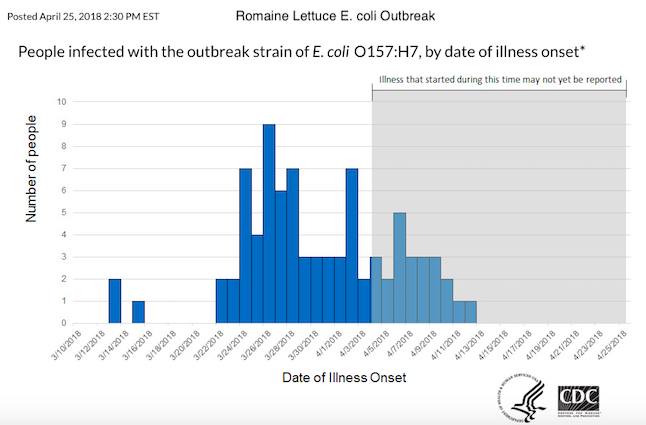The E. coli outbreak linked to romaine lettuce grown in Yuma, AZ now includes 84 people in 19 states half of whom have been hospitalized, nine with a form of kidney failure called hemolytic uremic syndrome (HUS), according to the latest update from the Centers for Disease Control and Prevention (CDC). Since the agency’s update on April 18, the outbreak has grown to include 31 more people and three more states, yet health officials still have been unable to say with certainty the name or names of the companies implicated.
What they do know, is that the tainted lettuce came from Yuma, AZ and they have warned consumers not to purchase, order or eat any romaine lettuce unless they know it was grown elsewhere. Some recalls have been issued, but lots of romaine remains on the shelves of grocery stores nationwide an on restaurant menus.
This has caused some frustration among consumers- who have found that the state of origin does not appear on all forms of romaine; and for some romaine producers who have issued statements saying their lettuce is not implicated in the outbreak.
Romaine Lettuce Shipments from Yuma Have Stopped
Since the last CDC update, romaine production in Yuma has stopped, as it usually does this time of year when romaine production shifts from Arizona to California where 77 percent of our nation’s romaine is grown. Romaine now making its way to store shelves is also grown in Florida and Mexico.
Given the lack of a uniform system of state-of-origin labeling, it’s not clear how much the warning can do to ease the minds of consumers worried about the life-threatening illness E. coli O157:H7 poses. It’s also not clear how that may affect the U.S. Food and Drug Administration’s (FDA’s) traceback investigation to find the source of the outbreak.
Romaine Lettuce E. coli O157:H7 Outbreak Investigation
The first illnesses associated with this outbreak were reported in mid-March and the most recent cases included in the CDC’s current update reported onset of illness through April 13. During this time, the CDC has been interviewing patients about what they ate and where they ate it, and the FDA has been interviewing the restaurants, stores and other establishments where the tainted lettuce was sold or served.
Almost all of the patients interviewed by the CDC, 96 percent, said they ate romaine lettuce in the week before they became ill and most of them said they ate it at restaurants. Stool samples from all of them were collected, cultured and then genetically tested. Results show that 84 people in 19 states were all sickened by the same strain of E. coli.
While the CDC has been interviewing patients, FDA investigators have been trying to trace back the route that the lettuce took to get to the establishment where it was sold to try and identify a common source. When there is no packaging, the FDA has to work with state and local partners to collect and analyze shipping documents. “This process is labor-intensive, but also dependent on the availability and quality of records,” the FDA said in its most recent update.
The restaurants named by patients said they used bagged, chopped, romaine lettuce to make the implicated salads. State and federal health officials haven’t disclosed the names of these restaurants, but one, Panera Bread, has been named in a lawsuit.

“Restaurants need to take responsibility for serving contaminated food,” said Fred Pritzker, an E. coli lawyer with noted food safety law firm Pritzker Hageman which has won settlements for HUS cases of $7.5 million and $4.5 million. “Eating a salad should not send someone to the hospital.”
The FDA says romaine lettuce potentially contaminated with E. coli O157:H7 was grown in Yuma, but “was supplied to restaurants and retailers through multiple processors, grower/shipper companies, and farms.” The agency is tracing back clusters of illness to try and identify a single source or grower.
E. coli Food Poisoning and HUS
The CDC is reporting 84 cases in this outbreak. By state, they are: Alaska (5)*, Arizona (5), California (13), Colorado (2), Connecticut (2), Georgia (1), Idaho (10), Illinois (1), Louisiana (1), Michigan (2), Missouri (1), Montana (7), New Jersey (7), New York (2), Ohio (3), Pennsylvania (18), South Dakota (1), Virginia (1), and Washington (2). *On April 21, the Alaska health department reported an eight-person E.coli outbreak at Anvil Mountain Correctional Center in Nome that is a part of this outbreak. The CDC said at that time that the cases would be included in its next update, it is not clear why all of them have not been. One key element of these cases was that the romaine served at Anvil Mountain was delivered in whole heads, not already chopped in bags.
The three new states reporting cases are Colorado (2), Georgia (1) and South Dakota (1). States that reported an increase in cases since the last update were Alaska, California, Montana, Ohio, Pennsylvania, and Washington. The states that showed the largest increases in reported illnesses were California which went from one to 13 and Pennsylvania which increased from 12 to 18.
The 84 patients the CDC is reporting so far range in age from 1 to 88 years old, with a median age of 31. The majority of them, 65 percent are female. Forty-two of them have been hospitalized, including nine people who developed HUS, a type of kidney failure associated with E. coli infections. HUS, which can be fatal, affects between 5 percent an 10 percent of E. coli patients. Those most at risk are young children, seniors, pregnant women and people with compromised immune systems. HUS symptoms usually appear about a week after initial E. coli symptoms which include abdominal cramping and diarrhea that can be watery, bloody or explosive.
Anyone with symptoms of HUS needs immediate, emergency medical attention. These symptoms include:
- Feeling very tired
- Unexplained weakness
- Fainting
- Paleness
- Decreased urination
- Unexplained bruises or bleeding
The E. coli lawyers at Pritzker Hageman have a successful track record representing clients nationwide who have been sickened by contaminated food and have represented clients in nearly every major outbreak over the last 20 years including this one. If you or a loved one have been sickened by E.coli, contact them for a free, no-obligation consultation.
